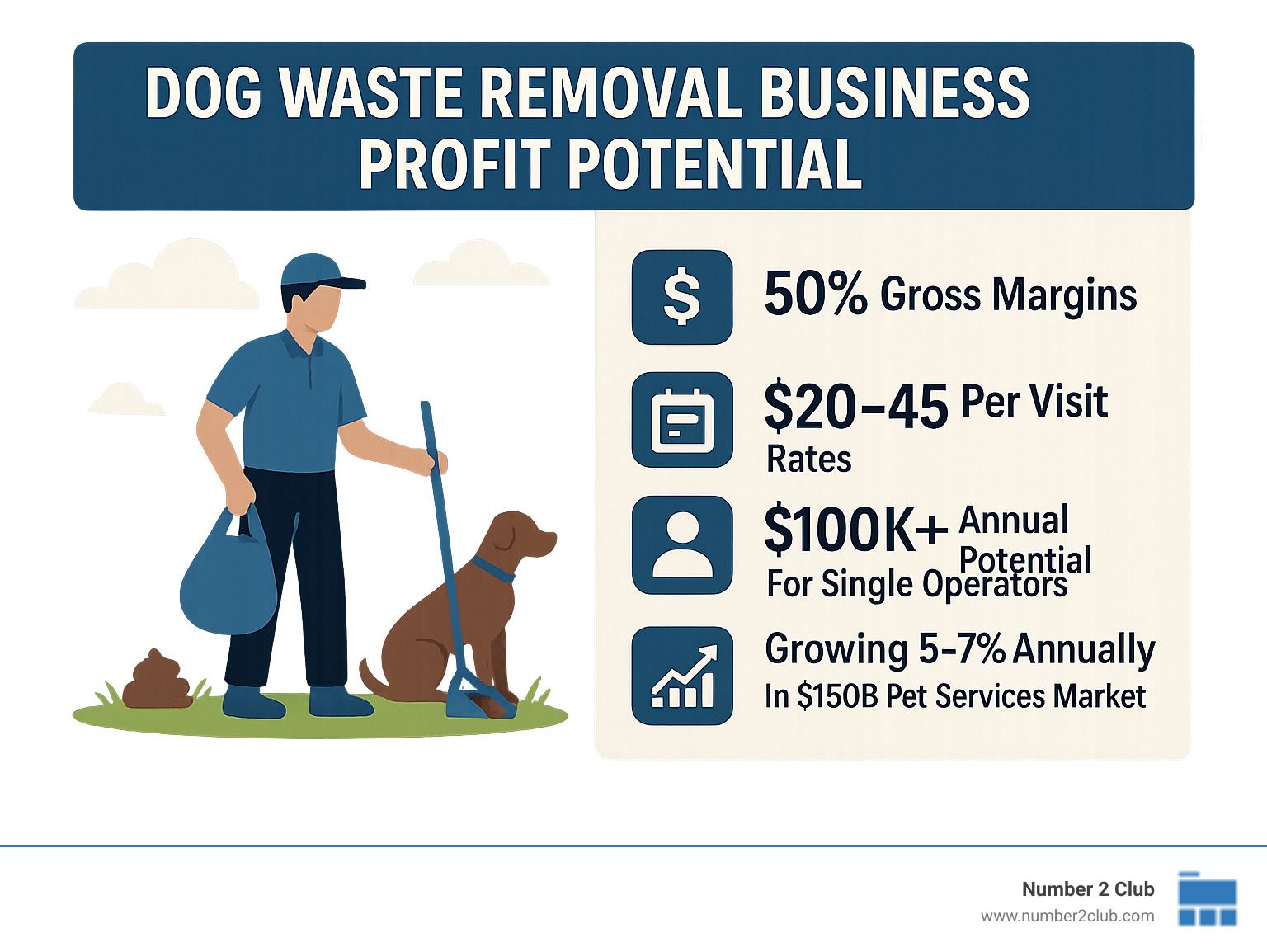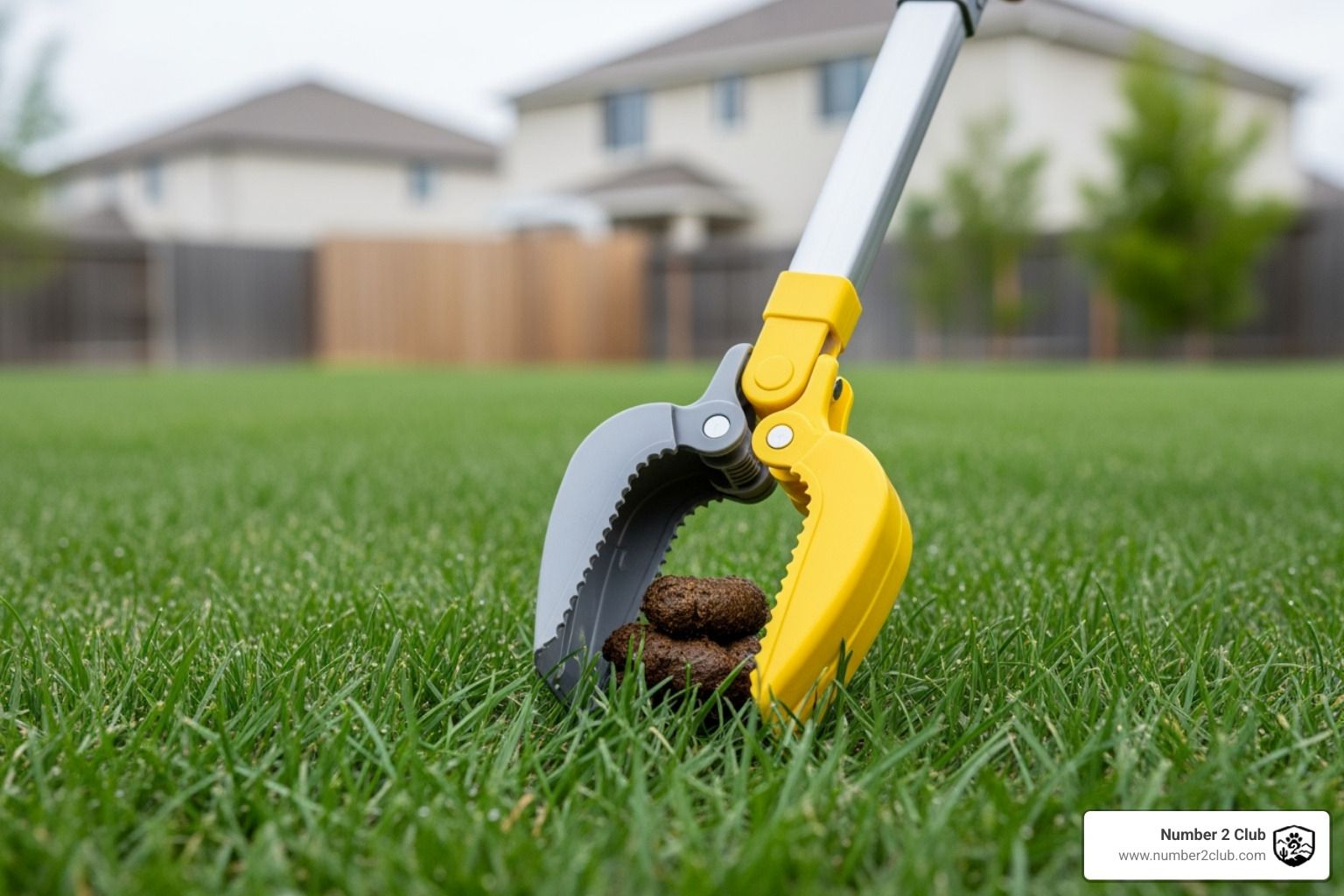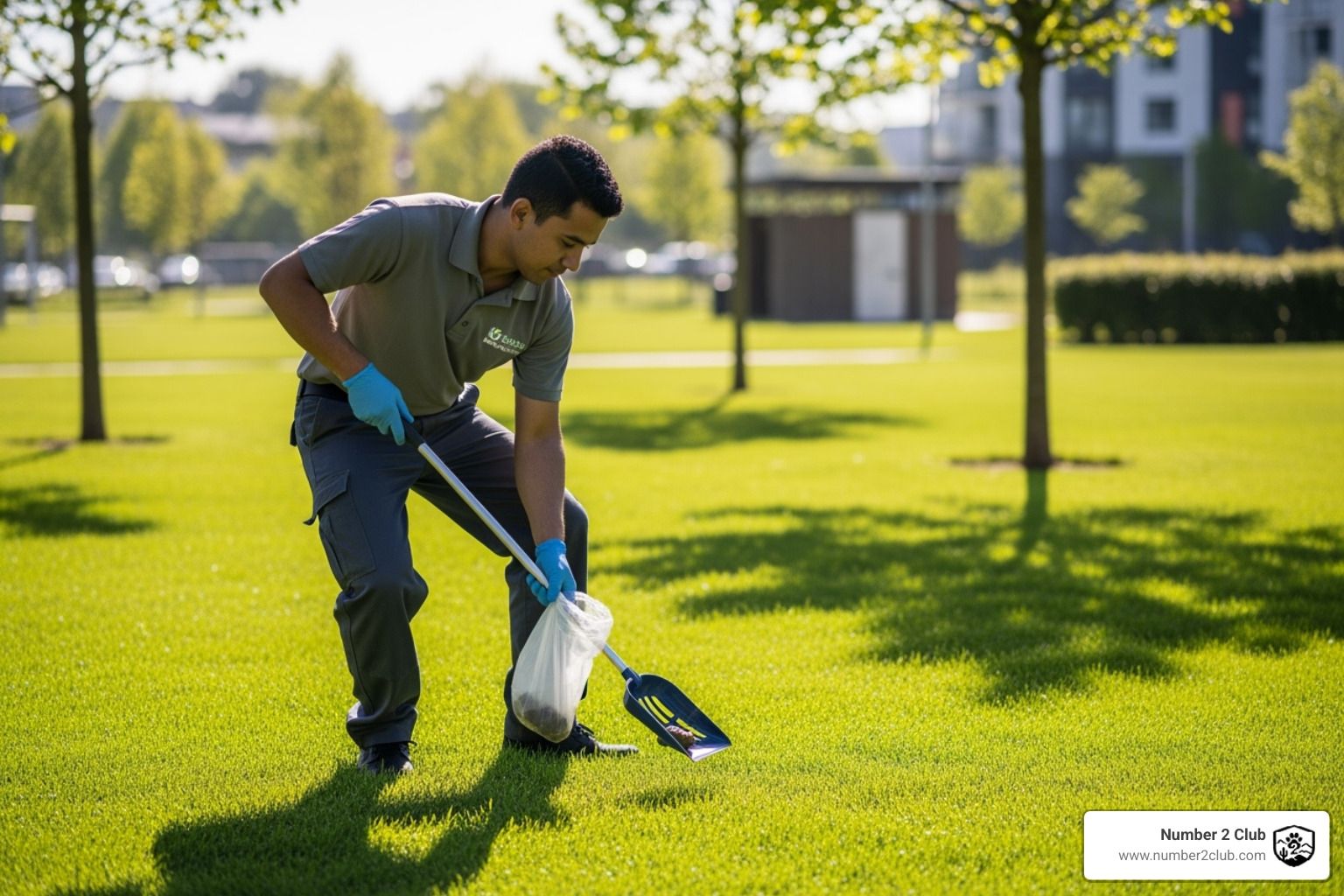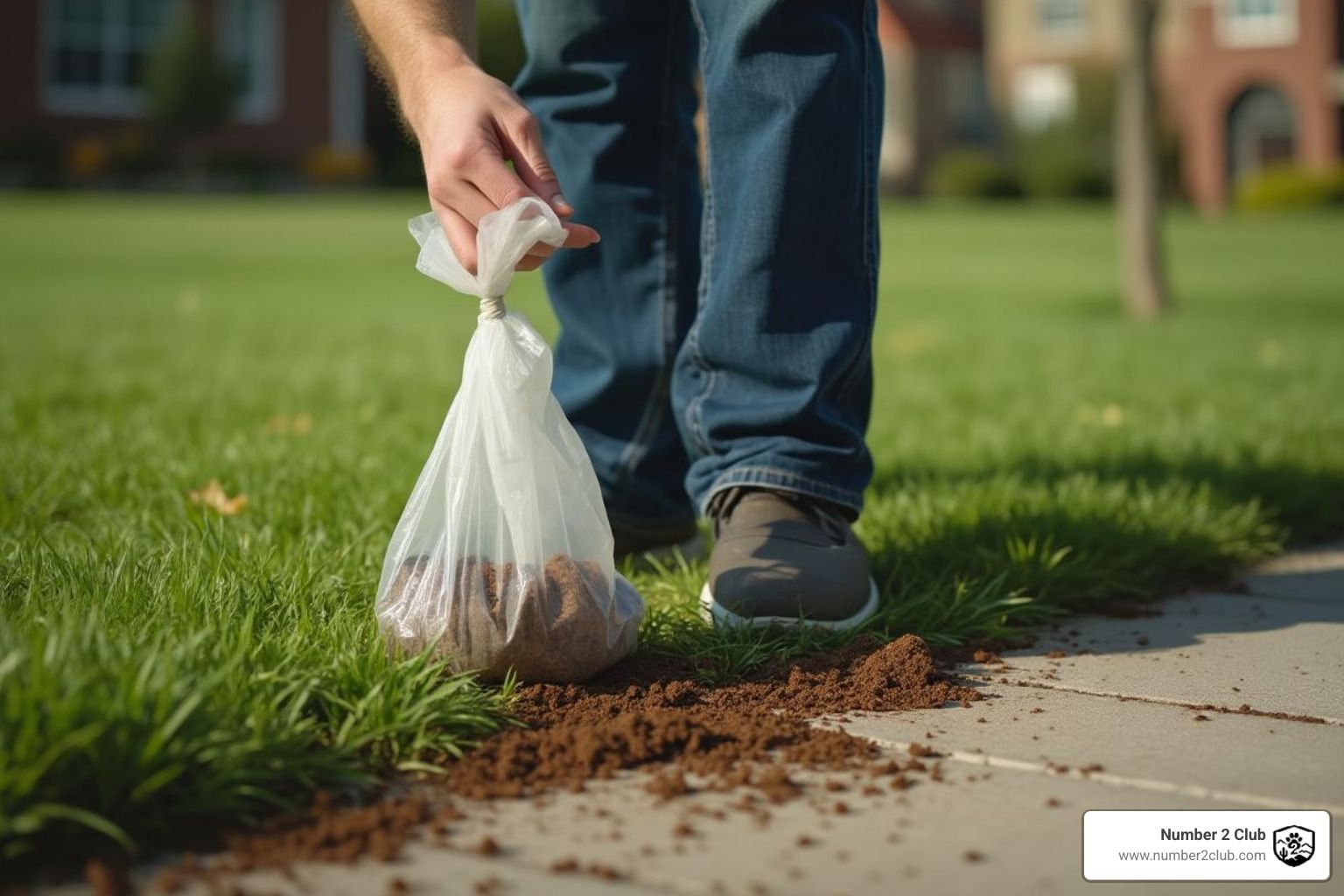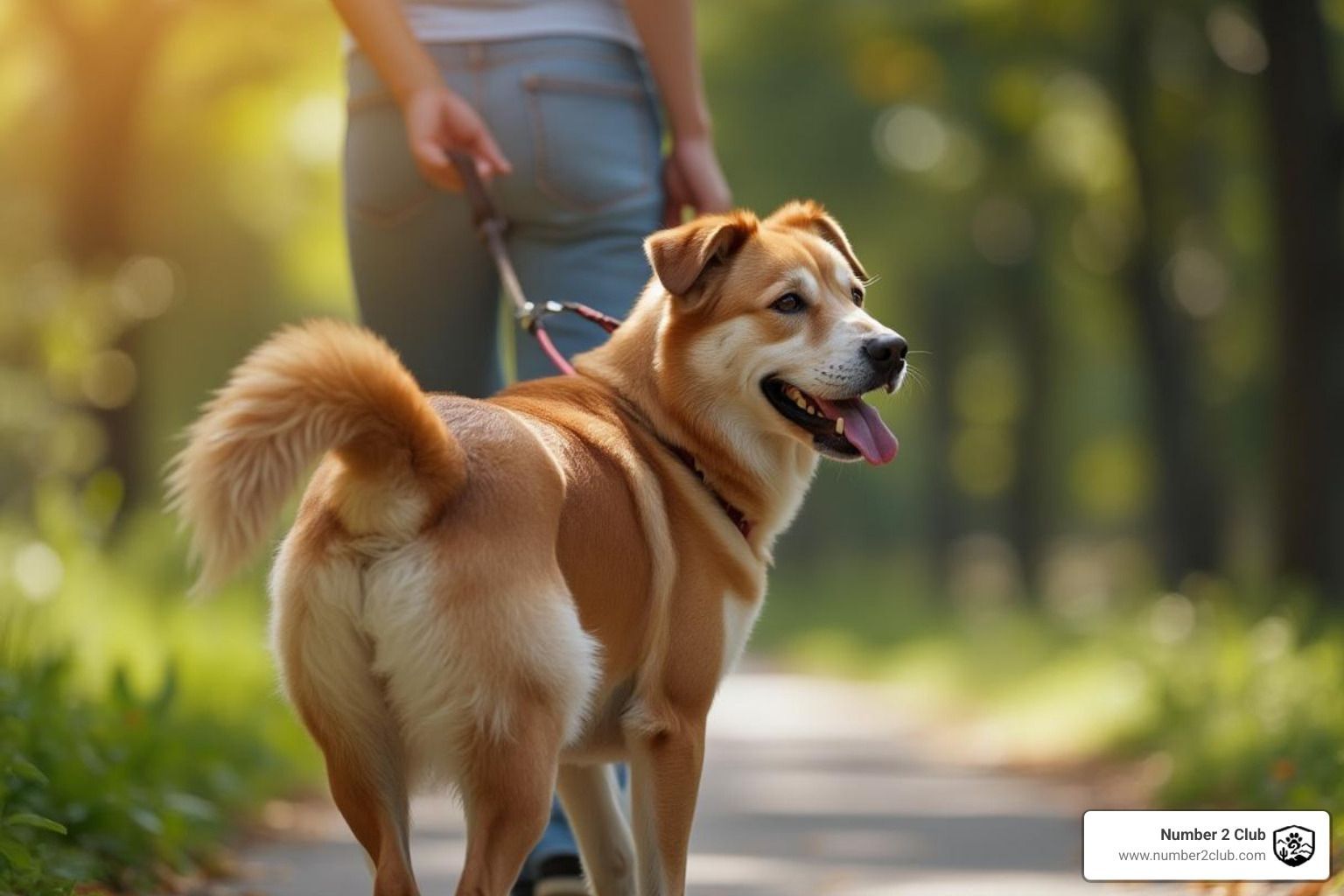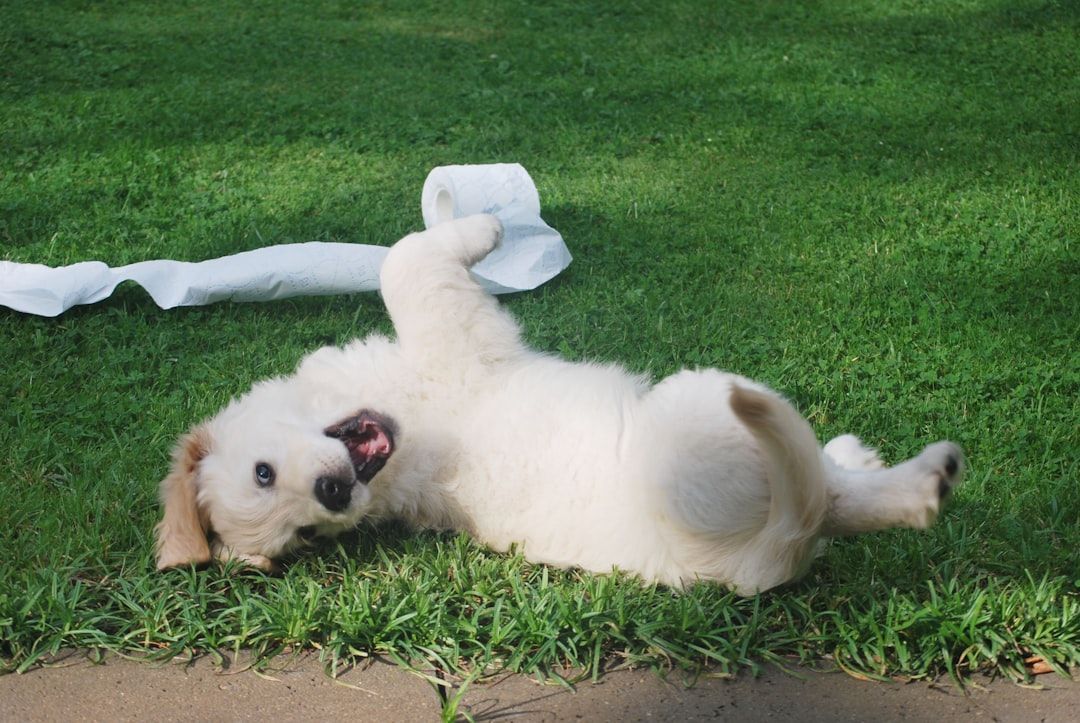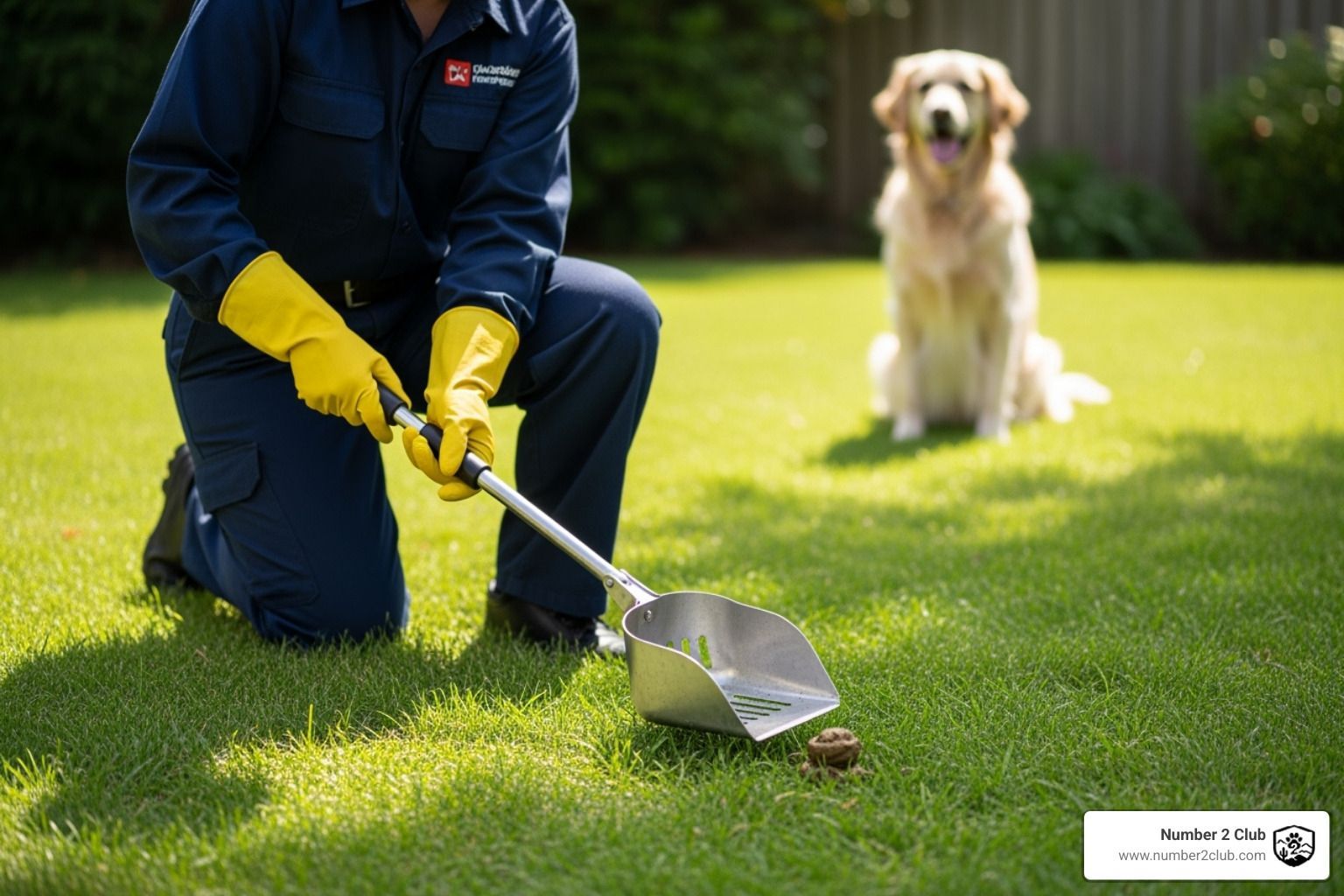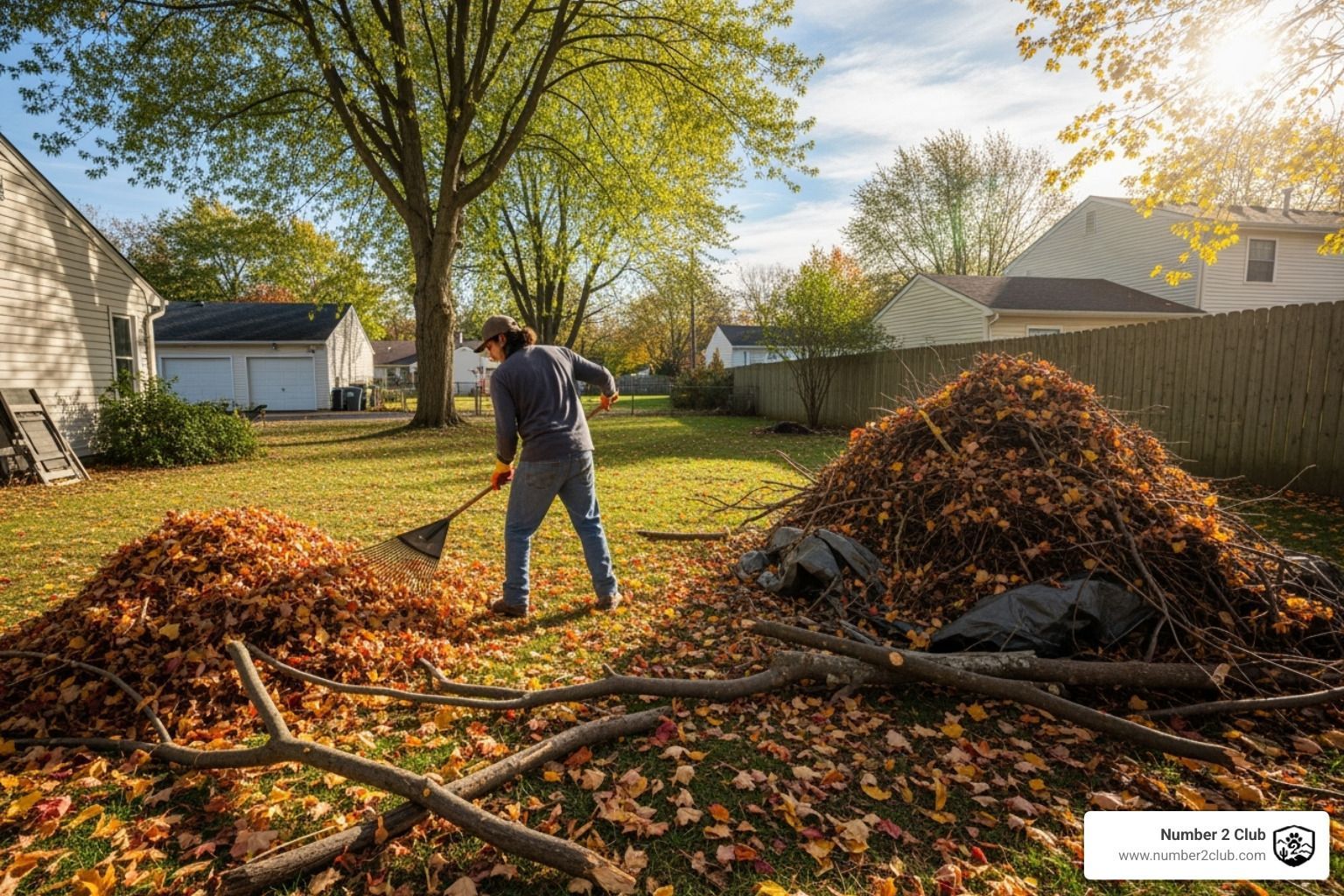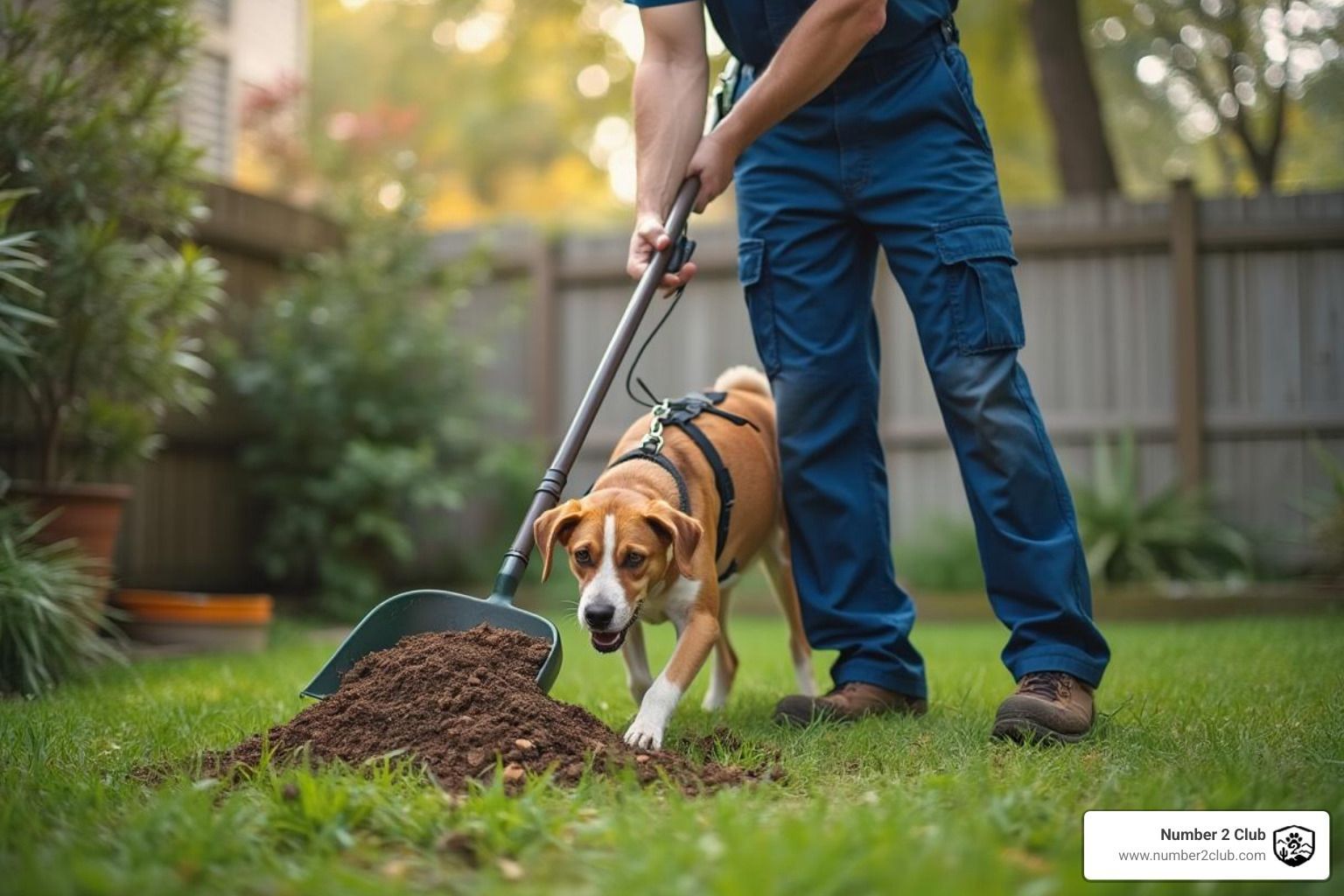How to Launch Your Own Dog Waste Removal Business (Without Stepping in It)
Why the Dog Waste Removal Business is a Growing Goldmine
A dog waste removal business offers one of the most straightforward paths to entrepreneurship, with minimal startup costs and steady demand from busy pet owners. Here's what you need to know:
Key Business Facts: • Market size: Part of the $150.6 billion pet services industry • Growth rate: 5-7% annually • Startup costs: Under $1,000 to launch • Earnings potential: $20-45 per visit, $100K+ annually possible • Equipment needed: Rake, pan, bags, gloves, disinfectant • Target market: 44.5% of US households (90 million dogs)
The numbers tell an incredible story. The average dog creates 274 pounds of waste per year - that's a lot of cleanup most owners would gladly pay someone else to handle. As one successful entrepreneur shared: "Most people don't wake up in the morning saying, 'You know what? I want to clean up dog poop for a living!' So, I thought it would be fun to tell you how I got started in the dog poop clean up business."
Why this business works so well:
- Low barrier to entry - no special skills or expensive equipment required
- Flexible schedule - work weekends, evenings, or full-time
- Recession-resistant - people will always have dogs that need cleanup
- Health benefits - outdoor work and physical activity
- Environmental impact - proper disposal protects water sources
The beauty lies in its simplicity. While others obsess over complex business models, you can start earning within weeks by solving a problem every dog owner faces daily.
I'm Joseph Lopez, and while my primary expertise is in scaling mobile IV therapy companies and digital marketing, I've helped numerous service-based businesses launch and grow, including several dog waste removal business ventures. The same principles that built my multimillion-dollar healthcare companies apply perfectly to this industry - strong operations, smart marketing, and exceptional customer service.
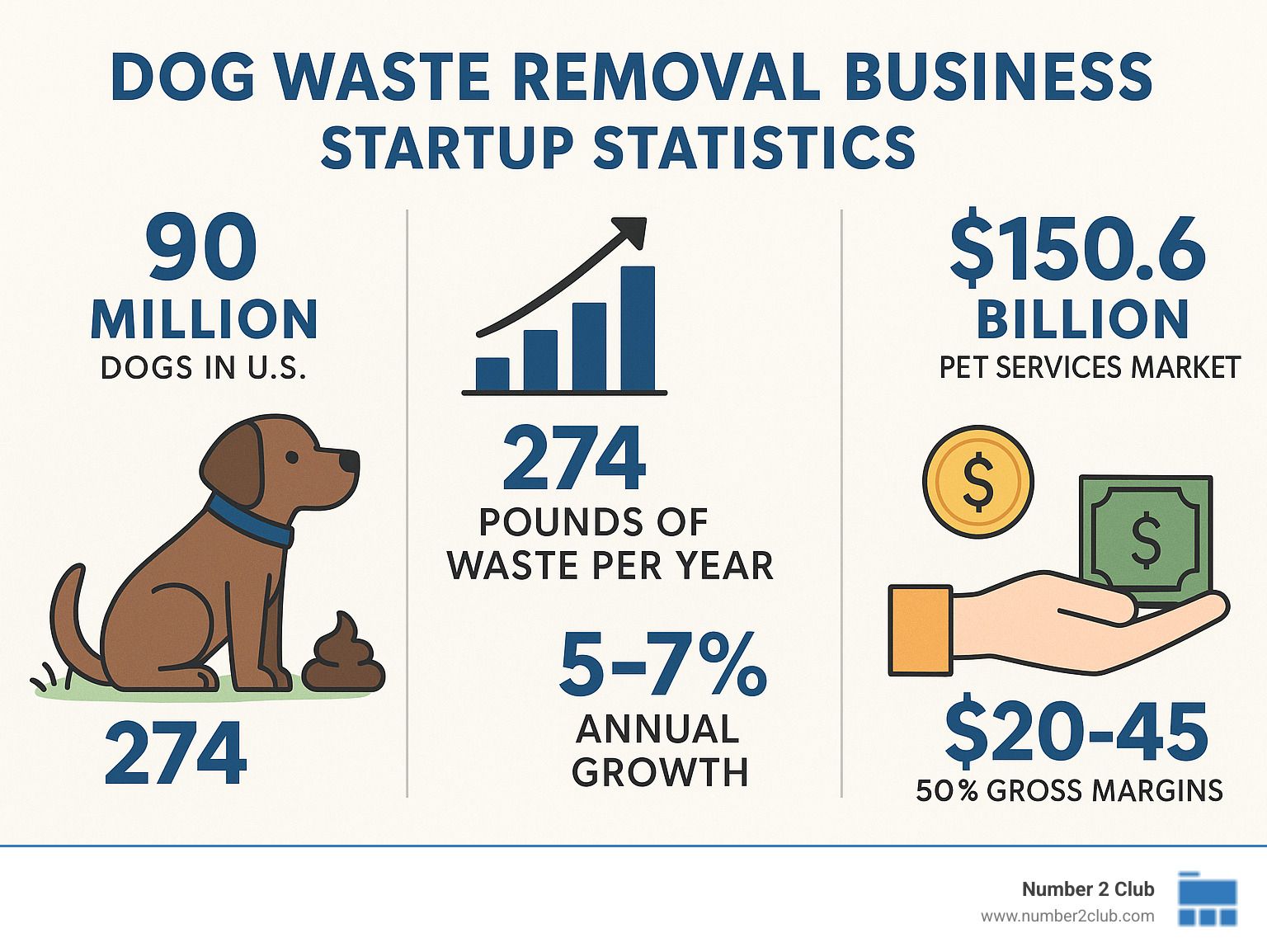
Dog Waste Removal Business 101: Market & Demand
The dog waste removal business taps into something pretty amazing - the massive $150.6 billion U.S. pet services market that keeps growing every single year. We're talking about steady 5-7% annual growth, which means more opportunities for entrepreneurs like you who want to build something real.
Here's what makes this market so solid: 67% of U.S. households own pets, and 44.5% specifically have dogs. That's up from just 38% in 2016! We're looking at roughly 90 million dogs across the country, and here's the kicker - each dog produces an average of 274 pounds of waste annually. That's nearly three-quarters of a pound every single day.
Scientific research on pet ownership growth shows millennials and Gen Z are adopting pets at record rates. This isn't just a trend - it's a lifestyle shift that creates real business opportunities.
The health side of this business is serious too. A single gram of dog waste contains 23 million fecal coliform bacteria, which can cause cramps, diarrhea, and even serious kidney problems in humans. When you frame your service around health and safety, customers understand why professional cleanup matters.
What a "pooper scooper" service actually does
A professional dog waste removal business is much more than just cleaning up messes. You're providing peace of mind to busy families and maintaining healthy outdoor spaces where kids and pets can play safely.
Your residential services become the backbone of steady income. Most customers want weekly or bi-weekly cleanups, but you'll also handle monthly maintenance for smaller properties. The initial deep-clean service often becomes your highest-paying job - especially when you're dealing with yards that haven't been maintained properly.
Many successful operators add yard deodorizing treatments and special event cleanups for holidays or parties. These extras boost your average ticket and show customers you care about more than just the basics.
Commercial opportunities open up bigger revenue streams. Apartment complexes and HOA communities need regular service for common areas. Dog parks and pet-friendly businesses require consistent maintenance to stay compliant with health codes. You can even expand into pet waste station installation and maintenance for properties that want permanent solutions.
The beauty of this business model is recurring subscriptions. Instead of hunting for new customers every week, you build a base of monthly clients who provide predictable income. One successful operator shared: "We believed in the idea and gave it all we had... Today, we're the #1 dog poop clean up and pet waste station service business" after growing to serve 20 states.
Why demand keeps rising for a dog waste removal business
Several powerful trends are driving more customers to seek professional pet waste services, and understanding these helps you market more effectively.
Busy modern lifestyles create your biggest opportunity. Dual-income households, long commutes, and packed family schedules leave little time for yard maintenance. As one happy customer put it: "I was always the one to clean the back yard. It was last on my 'to do' list... It is so nice to have a nice view of the yard and no more worries!"
The aging pet owner population represents a growing market segment. Many dog owners find bending, squatting, and heavy lifting increasingly difficult as they get older. Your service helps them maintain their beloved pets without physical strain or safety risks.
HOA regulations and municipal codes are getting stricter about pet waste cleanup. Many communities now fine residents for accumulated waste, making professional services a necessity rather than a luxury. This regulatory trend works in your favor by creating demand you don't have to generate yourself.
Environmental awareness drives customers who understand that pet waste seriously pollutes waterways. The EPA estimates that waste from just 100 dogs over 2-3 days can temporarily close a bay and all watershed areas within 20 miles to swimming and shellfishing. When customers learn these facts, they see your service as environmental responsibility, not just convenience.
Water-quality fines from local authorities add another layer of urgency. Property managers and homeowners associations face real financial penalties when pet waste runoff affects local water systems, making professional cleanup services a smart investment in compliance.
Setting Up Your Dog Waste Removal Business Legally & Affordably
Getting your dog waste removal business off the ground doesn't require a law degree or deep pockets. The beauty of this venture lies in its simplicity - you can establish everything legally and affordably, often for less than $1,000 total.
When choosing your business structure, you'll mainly decide between a sole proprietorship with DBA registration or forming an LLC. For most new operators, starting as a sole proprietorship keeps things simple and costs low. You can always upgrade to an LLC later as your business grows and you want extra liability protection.
Your total startup investment typically runs under $1,000, making this one of the most accessible businesses to launch. One entrepreneur shared how they started with just $174 and made $280,000 in their first full year - that's the kind of return on investment that gets people excited about this industry.
Startup costs & essential equipment list
Your equipment list stays refreshingly short and affordable. Quality matters more than quantity since you'll use these tools every single day, often in challenging weather conditions.
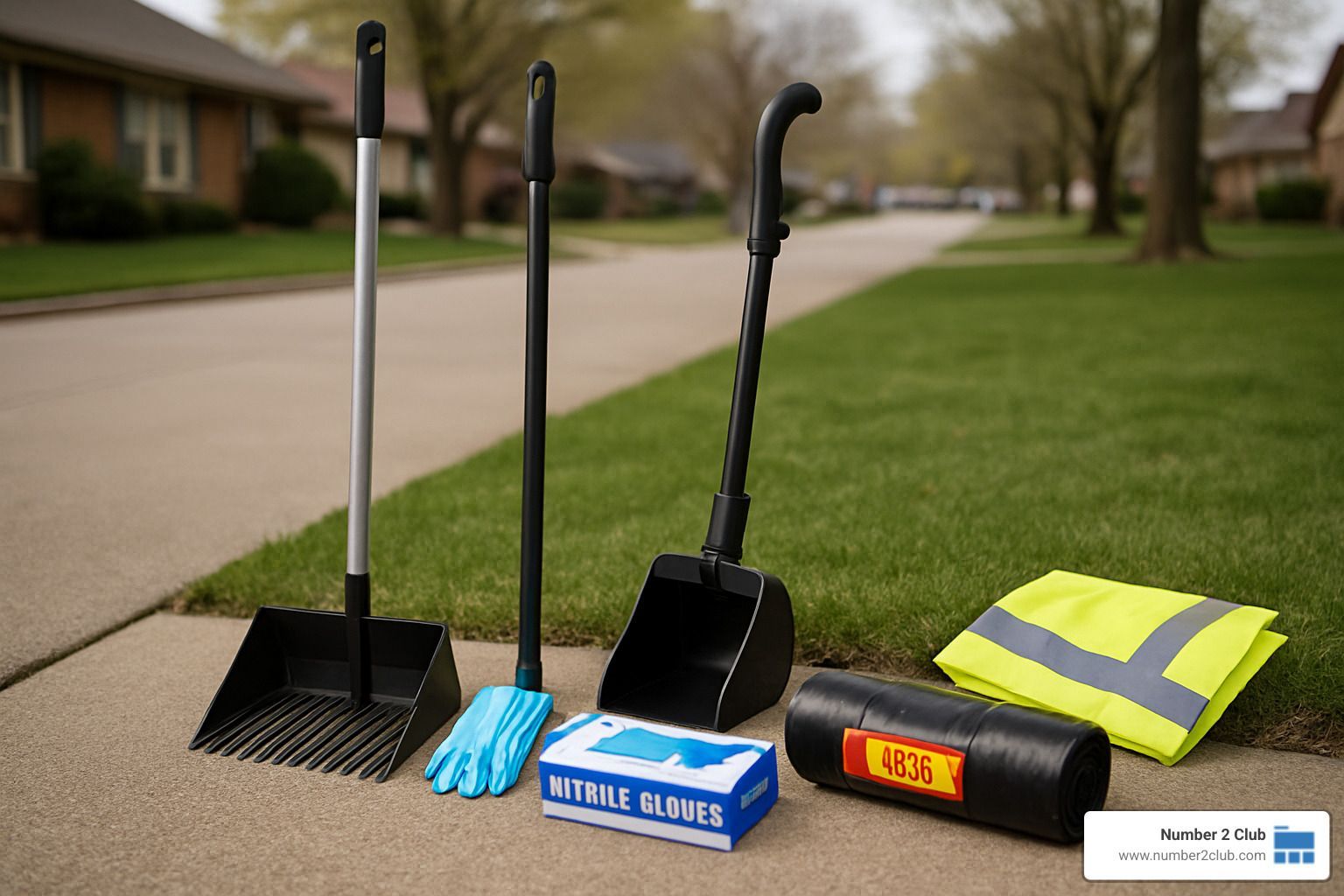
Your core scooping setup centers around a heavy-duty rake and pan combination. Look for models with comfortable grips and sturdy construction - cheap tools break quickly and cost more in the long run. A long-handled pooper scooper with spring-loaded action saves your back and reduces hand fatigue during long routes.
Safety gear protects both you and your reputation. Nitrile gloves offer better puncture resistance than latex and won't trigger allergies. Heavy-duty contractor bags (13-gallon size works well) handle the weight without tearing. Kennel-grade disinfectant kills pathogens that regular cleaners miss, while disposable boot covers prevent you from tracking waste between properties.
Don't forget the professional touches that justify higher rates. Branded uniform shirts make you look legitimate, while a basic first aid kit shows you take safety seriously. Hand sanitizer and cleaning wipes keep you fresh between stops.
Your vehicle needs stay minimal - sealed storage containers prevent odors, cleaning supplies handle spills, and route planning tools (even just your smartphone) keep you efficient. Most operators spend $200-400 total on equipment that lasts for years with proper care.
Permits, insurance & local regulations
Legal compliance might sound intimidating, but it's actually straightforward for most dog waste removal business operators. Requirements vary by location, so start by calling your city clerk's office - they'll tell you exactly what you need.
Most areas require a general business license from your city or county, typically costing $50-200 annually. Some jurisdictions want a waste management permit or health department approval, especially if you're handling commercial properties. Sales tax permits become necessary if your area charges tax on services.
Insurance starts as optional but becomes essential as you grow. Smart operators get coverage early rather than risk major liabilities later. General liability insurance protects against property damage or injury claims. Commercial auto coverage becomes mandatory if you're using your vehicle primarily for business. Workers' compensation kicks in when you hire your first employee.
Health regulations matter more than you might think. Scientific research on parvo prevention shows that canine parvovirus and other pathogens survive in soil for months. Proper disinfection protocols protect both you and the communities you serve.
Environmental rules govern waste disposal methods. Some areas restrict how you can dispose of collected waste, while others require specific handling procedures. Research your local codes before launching - it's much easier to start compliant than fix problems later.
Choosing a memorable brand & online presence
Your brand name shapes how customers perceive your service, so choose something professional that won't embarrass clients. While poop puns might seem fun, they can actually hurt your business when customers feel awkward recommending you to neighbors.
Effective names include words like "waste removal," "scoop," or "clean" to make your service immediately clear. Geographic identifiers help with local SEO and make you feel more established in the community. Always check domain availability and search for trademark conflicts before committing to a name.
Visual consistency builds trust and recognition. Pick a two-color scheme and stick with it across everything from business cards to vehicle decals. Professional uniforms and branded materials signal reliability and justify premium pricing compared to casual operators.
Your digital presence starts simple but grows over time. Register matching domain names and social media handles even if you're not ready to use them all immediately. A basic website with service descriptions and contact information gives you credibility, while Google Business Profile helps local customers find you.
Professional appearance directly impacts your earning potential. Customers pay more for services that look established and trustworthy, making your branding investment one of the smartest moves you'll make.
Operations, Safety & Eco-Friendly Disposal Best Practices
Running a successful dog waste removal business comes down to smart systems and safe practices. When you nail the operational side, everything else becomes easier - from earning more per hour to keeping customers happy for years.
More info about residential services shows how professional operators build systems that work smoothly day after day.
The foundation of great operations starts with smart route planning. Choose a service area you can drive across in 45 minutes or less. This simple rule prevents you from wasting hours driving between clients. One successful operator shared how clustering clients geographically let them complete routes with just 2-5 minutes of travel between properties.
Your client onboarding process sets the tone for everything that follows. Start each new customer with a thorough initial cleanup - some yards haven't been cleaned in months! Document any special instructions about aggressive dogs, gate locations, or property quirks. Get clear access arrangements and emergency contacts upfront.
When it comes to dog handling, safety trumps everything else. Carry treats to make friends with friendly dogs, but never enter a yard with an aggressive animal running loose. A quick text to the owner before entering can prevent dangerous situations. Trust your instincts - if a situation feels unsafe, reschedule for when the dog is secured.
Scheduling & route optimization tools
Modern technology transforms how efficiently you can run your dog waste removal business. The right tools help you pack more clients into each day while reducing drive time and fuel costs.
Sweep&Go was built specifically for pooper scooper businesses. It handles route optimization, customer management, and automated billing in one platform. Jobber offers excellent mobile apps and customer communication features that work well for any field service business. Yard Book adapts nicely from its landscaping focus to waste removal operations.
The real magic happens with GPS clustering. Group your clients by neighborhood and service area to minimize travel time. Build your routes so you're moving efficiently from house to house rather than zigzagging across town. This planning can easily add 3-4 extra clients to your daily capacity.
Smart scheduling practices keep everything running smoothly. Batch similar services together - do all your weekly clients on certain days, bi-weekly on others. Build buffer time for initial cleanups that always take longer than expected. Have backup plans for weather delays, and automate appointment reminders so clients know you're coming.
Safe handling & disease prevention
Pet waste carries serious health risks that proper safety protocols can completely prevent. Taking these precautions protects your health and prevents spreading diseases between properties.
Personal protective equipment forms your first line of defense. Fresh nitrile gloves for each property prevent contamination between yards. Boot covers stop you from tracking waste and pathogens from house to house. Long sleeves and pants minimize skin exposure, while eye protection matters when using disinfectant sprays.
Equipment sanitization between properties prevents spreading diseases like parvovirus, which scientific research on parvo prevention shows can survive in soil for months. Use kennel-grade cleaners to disinfect your tools after each yard. This extra step protects the entire neighborhood's dog population.
Your hygiene protocols complete the safety picture. Hand sanitizer after each property becomes second nature. Never touch your face during service hours, and always shower and change clothes when you finish your route. These simple habits prevent illness and keep you working consistently.
Environmentally responsible disposal
Proper waste disposal protects local waterways while keeping your business compliant with environmental regulations. You have several proven methods to choose from.
The customer trash can method works perfectly for most residential clients. Bag the waste in heavy-duty containers that won't leak or tear, seal everything properly to prevent odors, and coordinate with each client's pickup schedule. Always have backup plans for full containers - frustrated customers call quickly when their bins overflow.
Commercial dumpster rental makes sense for larger operations. You get a centralized disposal point that handles bigger volumes without coordinating with individual clients. Professional waste management companies handle the pickup, so you focus on service delivery instead of disposal logistics.
Emerging eco-friendly options include composting programs, though these require careful management and local approval. Dog waste composting differs significantly from standard organic composting due to pathogen concerns, so research thoroughly before exploring this route.
More info about commercial services demonstrates how larger-scale operations manage waste disposal for apartment complexes and commercial properties where volume and efficiency matter most.
The key is choosing disposal methods that work reliably for your service area and client base. Consistency in disposal practices builds customer trust and keeps your operations running smoothly day after day.
Pricing, Marketing & Growth Strategies for Your Dog Waste Removal Business
Getting your pricing right can make or break your dog waste removal business. The sweet spot lies between charging enough to build a profitable business while staying competitive in your local market.
Most successful operators charge $20-45 per residential visit, with rates varying based on your location, property size, and how often you visit. The best part? Single owner-operators who price correctly often earn over $100,000 annually, while larger operations with employees can generate millions in revenue.
The key is understanding that you're not just competing on price - you're selling convenience, health protection, and peace of mind. When customers realize they're paying less than $10 per week to never deal with dog waste again, your service becomes a no-brainer purchase.
Setting profitable rates & margins
Before setting any prices, you need to know your true costs. Many new operators make the mistake of only considering obvious expenses like bags and gas, then wonder why they're working for minimum wage.
Calculate everything: equipment replacement, vehicle wear and tear, insurance, marketing costs, and most importantly, what you want to earn per hour. One successful operator shared: "I realized I was making $8 per hour until I properly calculated my real costs and adjusted pricing."
The most profitable dog waste removal businesses use tiered pricing that rewards frequent service while accounting for property complexity:
Don't forget the extras that boost your income. Initial cleanup fees of $50-150 for neglected yards often become your most profitable services. Yard deodorizing treatments add $15-25 per visit with minimal extra work. Holiday cleanups before parties command 25-50% premiums because customers desperately need pristine yards.
The numbers work beautifully when done right. Well-run operations achieve gross margins around 50% with net profit margins reaching 20%. That's better than most traditional businesses with much higher startup costs.
Low-cost marketing that works
Forget expensive advertising campaigns. The most successful dog waste removal businesses grow through smart, local marketing that builds genuine relationships with customers.
Your vehicle becomes your best marketing tool once you start operating. Professional vehicle wraps transform you from "some person with a shovel" into a legitimate business that customers trust with their property keys.
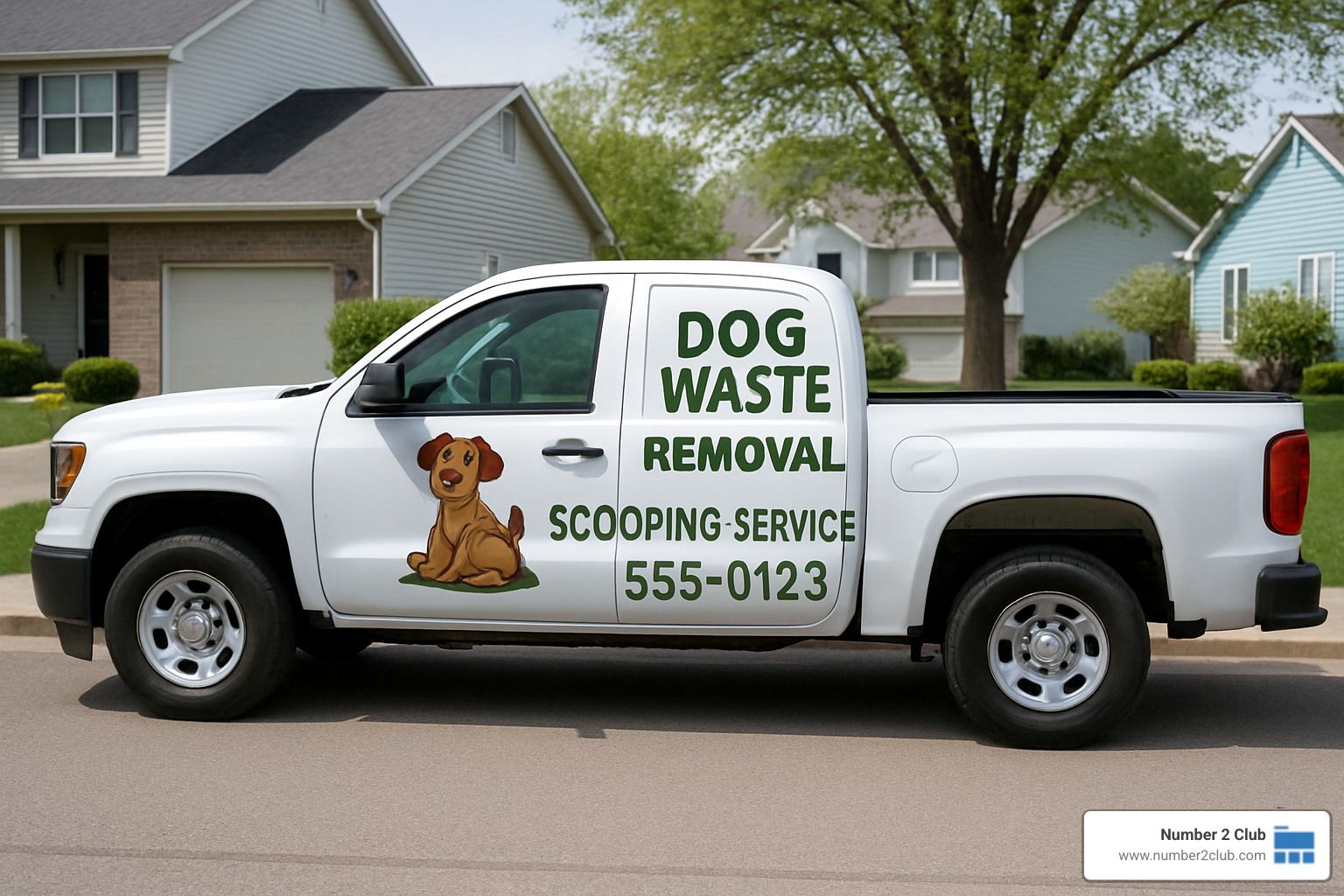
Digital marketing drives the most new customers when done consistently. Your Google Business Profile needs optimization for searches like "dog waste removal near me" - this free tool often generates more leads than paid advertising. Facebook ads targeting local pet owners work incredibly well because you can get specific about demographics and interests.
Join local Facebook groups where pet owners gather, but focus on being helpful rather than salesy. Share useful tips about pet health and yard maintenance. When people see you as the local expert, they naturally think of you when they need services.
Traditional methods still work in this relationship-based business. Door hangers in target neighborhoods introduce you to potential customers who might not think to search online. Partner with veterinarians and pet stores - they trust you with referrals when you demonstrate professionalism and reliability.
Customer reviews become your most powerful sales tool. Happy customers love talking about services that make their lives easier. Actively request reviews and respond professionally to all feedback. Each five-star review makes the next sale easier.
Build a referral program that rewards loyal customers for spreading the word. Offering service credits for successful referrals costs less than paid advertising and brings in pre-qualified prospects.
Scaling up: hiring & adding territories
Growth feels exciting, but scaling requires careful planning to maintain the quality that built your reputation. The biggest decision involves whether to hire employees or work with independent contractors.
Independent contractors offer flexibility and lower overhead, but you sacrifice some control over service quality. Employees require payroll taxes and workers' compensation insurance, but you can train them to your exact standards and build stronger customer relationships.
Whatever path you choose, invest heavily in training. Your reputation depends on every person who represents your business. Create detailed procedures for everything from customer greetings to waste disposal methods.
Territory expansion works best when you research thoroughly before committing. Look for neighborhoods with busy professionals, high dog ownership rates, and homes valued above your current market average. The data suggests roughly 14,833 dog-owning households per 100,000 population for market sizing.
More info about commercial services shows how expanding into apartment complexes and business properties can dramatically increase revenue per stop.
Systems become crucial as you grow beyond personal management. Advanced CRM platforms handle scheduling, billing, and customer communication automatically. Fleet management tools track vehicle maintenance and route efficiency. Quality control checklists ensure consistent service across all providers.
The goal is maintaining that personal touch customers love while building systems that work without your constant oversight. Many successful operators find their sweet spot at 3-5 employees before complexity outweighs profitability.
Every major service business started with one person and basic equipment. Focus on delivering exceptional service to your first customers, and growth becomes a natural progression rather than a stressful scramble.
Frequently Asked Questions about Starting a Dog Waste Removal Business
Starting a dog waste removal business raises plenty of questions, and honestly, that's totally normal. Most people never imagined they'd consider this type of work until they finded how profitable and straightforward it can be. Let me address the most common concerns I hear from aspiring entrepreneurs.
How profitable is a dog waste removal business?
Here's the exciting truth: a well-run dog waste removal business can be incredibly profitable with surprisingly high margins. The numbers might shock you in the best possible way.
The profit potential is real. Industry data consistently shows gross margins around 50% with net profit margins reaching 20% for efficient operations. That's better than many traditional businesses that require massive startup investments.
Let me break down what you can realistically expect to earn. Part-time operators typically make $15-25 per hour for actual scooping time, but remember - you're also building a recurring revenue base. Full-time single operators regularly earn between $40,000-100,000+ annually, with six-figure potential very achievable.
The success stories are inspiring. One entrepreneur I know started with under $1,500 and generated $280,000 in their first full year. Another operator grew from just 5 clients to 39 residential subscriptions within three months, creating over $2,000 in monthly recurring revenue while working only one day per week.
The magic happens with recurring subscriptions. Unlike one-time services, your dog waste removal business builds predictable monthly income. Services typically charge $20-45 per visit, and successful operators complete 8-15 properties per day once they optimize their routes.
The key to hitting these profit levels lies in efficient routing, competitive pricing, and excellent customer retention. When you keep customers happy, they stick around for years, creating that beautiful recurring revenue stream every business owner dreams about.
What equipment do I need to start?
One of the best things about this business is how little equipment you actually need. I love that almost anyone can afford to get started without taking on debt or major financial risk.
Your essential toolkit is refreshingly simple. You'll need a rake and pan set - invest in heavy-duty models since you'll use them daily. A long-handled pooper scooper with spring mechanism saves your back and reduces hand fatigue during long routes.
Stock up on 13-gallon heavy-duty trash bags because cheap bags that tear will ruin your day and your reputation. Disposable nitrile gloves protect your hands better than latex, and hand sanitizer plus disinfectant spray keep you healthy and professional between properties.
Don't forget basic first aid supplies - you're working outdoors with tools, so minor cuts happen. Smart operators stay prepared.
Any reliable vehicle works initially, though pickup trucks or vans provide better storage and look more professional. Many successful operators start with their personal vehicles before investing in dedicated service trucks. There's no shame in starting small and upgrading as you grow.
Technology keeps things simple too. Your smartphone handles GPS navigation and customer communication. Basic CRM software manages scheduling and billing, while payment processing apps like Venmo, Cash App, or Square make collecting payments effortless.
Total startup equipment costs typically range from $200-400, making this one of the most affordable service businesses you can launch. That's probably less than most people spend on a weekend getaway.
How should I dispose of the collected waste?
Proper waste disposal might seem complicated, but it's actually straightforward once you understand your options. The key is following local regulations while keeping customers happy.
Most residential clients prefer the customer trash can method. You bag the waste properly and place it in their regular trash containers. This approach works great because customers don't pay extra disposal fees, and it feels natural to them.
Success with this method requires coordination. You need to know client pickup schedules, use high-quality bags that won't leak, and have backup plans for full or missed containers. Good communication with customers prevents most problems.
Larger operations often choose commercial dumpster rental. This provides a centralized disposal point where you don't need to coordinate with individual clients. Professional waste management companies handle pickup, and you can handle much higher volumes without worrying about overfilling customer bins.
Environmental responsibility matters too. While some operators explore composting options, dog waste requires special handling due to dangerous pathogen content. Standard backyard composting isn't safe for dog waste without proper temperature control and processing systems.
Always verify local regulations before establishing your disposal procedures. Some municipalities have specific requirements for pet waste handling, and you want to stay compliant from day one. A quick call to your local waste management authority clears up any questions.
The disposal method you choose often depends on your business size and local market preferences. Start simple with the customer trash can method, then evaluate whether commercial disposal makes sense as you grow.
Conclusion & Next Steps
Starting a dog waste removal business isn't just about finding a side hustle - it's about stepping into a proven market that rewards hard work with real financial freedom. The numbers speak for themselves: under $1,000 to start, a market growing 5-7% annually, and the potential to earn six figures serving busy pet owners in your community.
Think about it this way - while others are still researching complex business models or saving for franchise fees, you could be earning money within weeks. The beauty of this industry lies in its simplicity and the fact that demand keeps growing as more households welcome dogs into their families.
Your journey starts with these essential steps: Begin by walking through your target neighborhoods to understand the local market and spot competitor pricing. Then establish your legal foundation by registering your business name and securing the basic permits you'll need. Invest in quality equipment that will serve you well through thousands of cleanups, and create professional branding that makes customers feel confident about hiring you.
The smart approach is to start focused and expand systematically. Choose a service area you can drive across in 45 minutes, perfect your systems with those first clients, then gradually add territories as you build capacity. Use technology for routing and scheduling from day one - it makes the difference between struggling to stay organized and running a smooth operation.
What excites me most about this opportunity is how it rewards the fundamentals of good business. Treat customers well, show up consistently, and maintain professional standards - these simple principles translate directly into customer loyalty and referrals. As one successful operator finded, you can grow from 5 clients to nearly 40 within just three months by focusing on excellent service.
More info about service in Litchfield Park shows how professional operators build thriving businesses throughout Arizona communities. Whether you're inspired to start your own dog waste removal business or you're a pet owner who could benefit from professional service, the industry continues growing because it solves a real problem people face every day.
The market opportunity is here, the barriers are low, and the demand keeps increasing. Every successful business owner started exactly where you are right now - with an idea and the willingness to take action. In this industry, that action might begin with something as humble as scooping waste, but it can lead to genuine business ownership and financial independence.
Your entrepreneurial story in pet waste removal begins with one simple decision: are you ready to turn a universal problem into your profitable solution? The tools are affordable, the knowledge is available, and the customers are waiting. All that's missing is your commitment to get started.
Number 2 Club is here as your trusted resource for maintaining clean, healthy yards throughout Arizona. Whether you're learning the business or seeking professional service, we're dedicated to supporting the growth of professional pet waste management that benefits our entire community.
